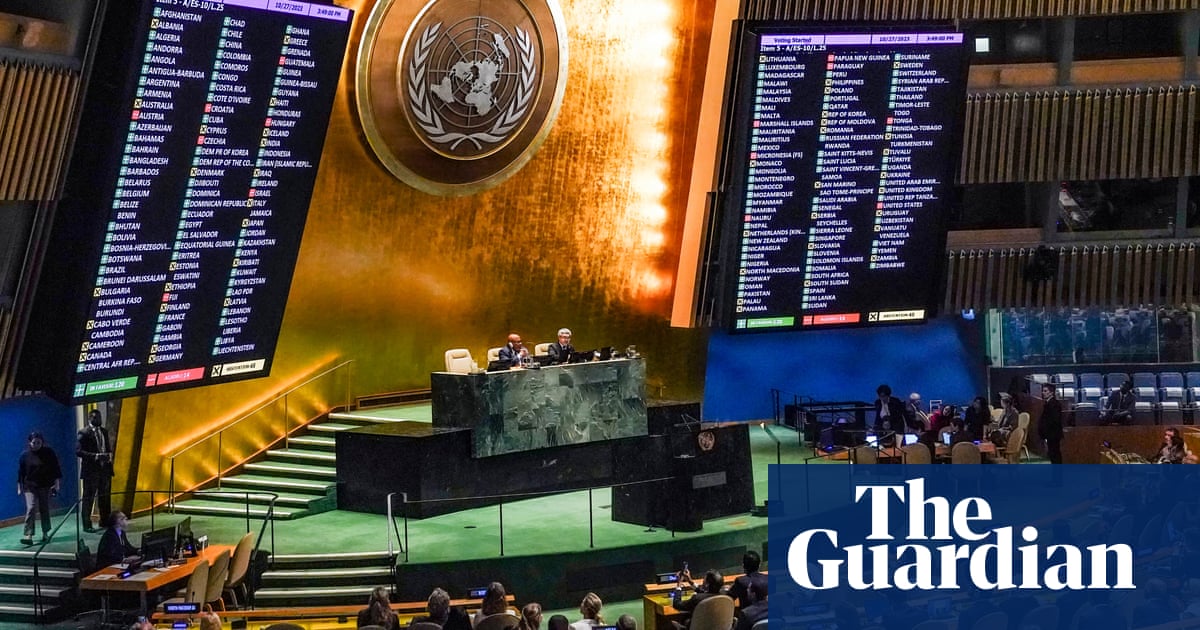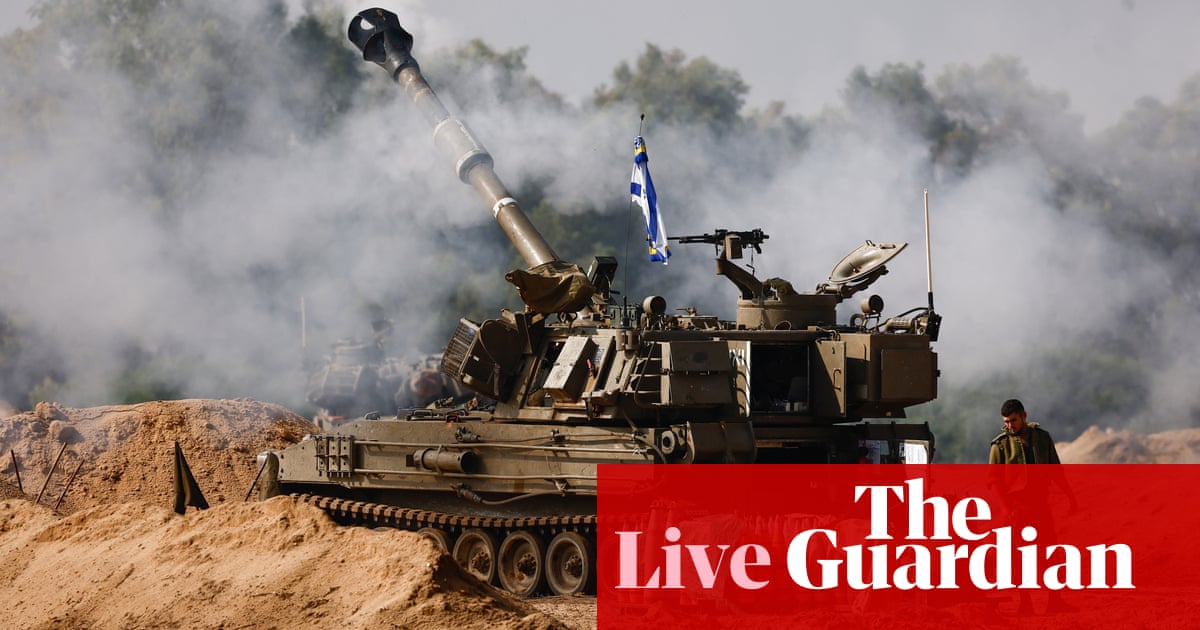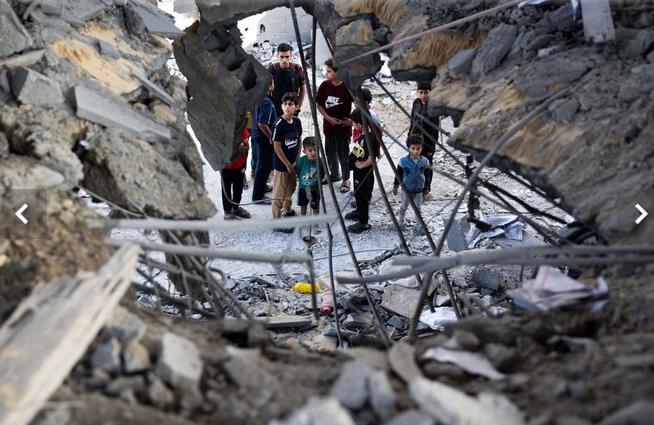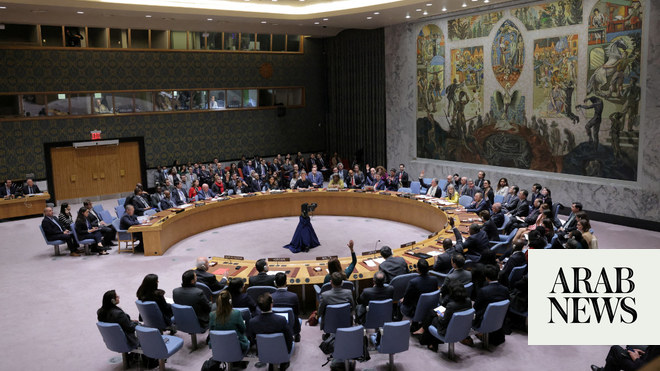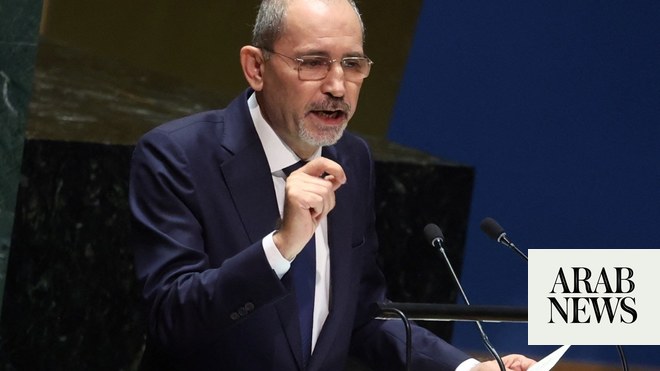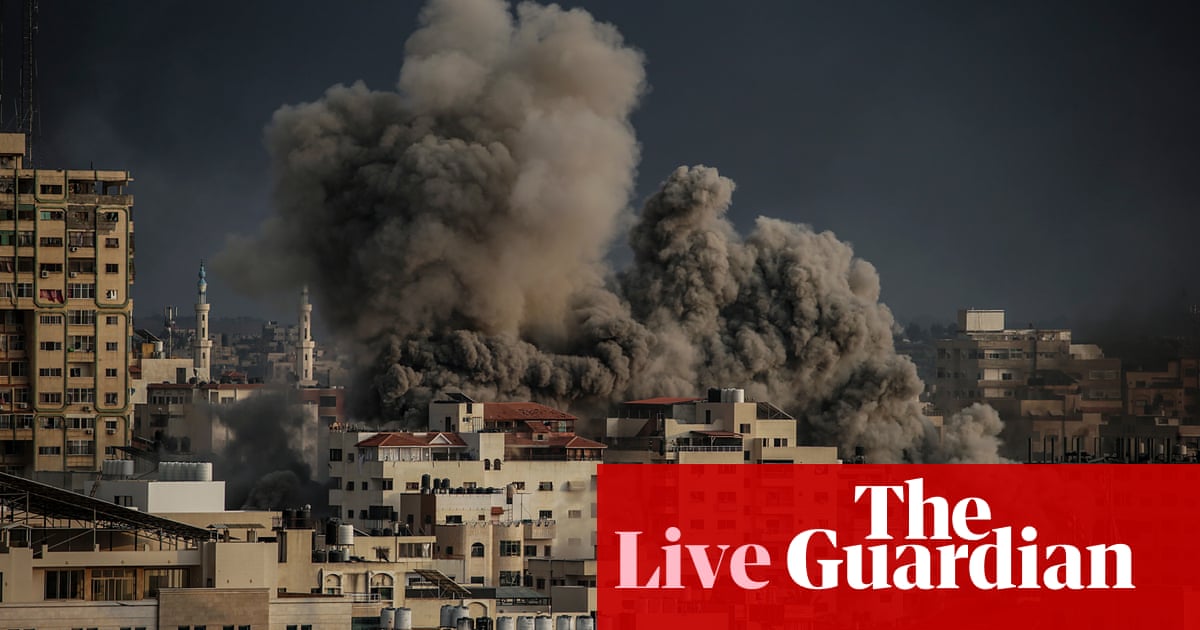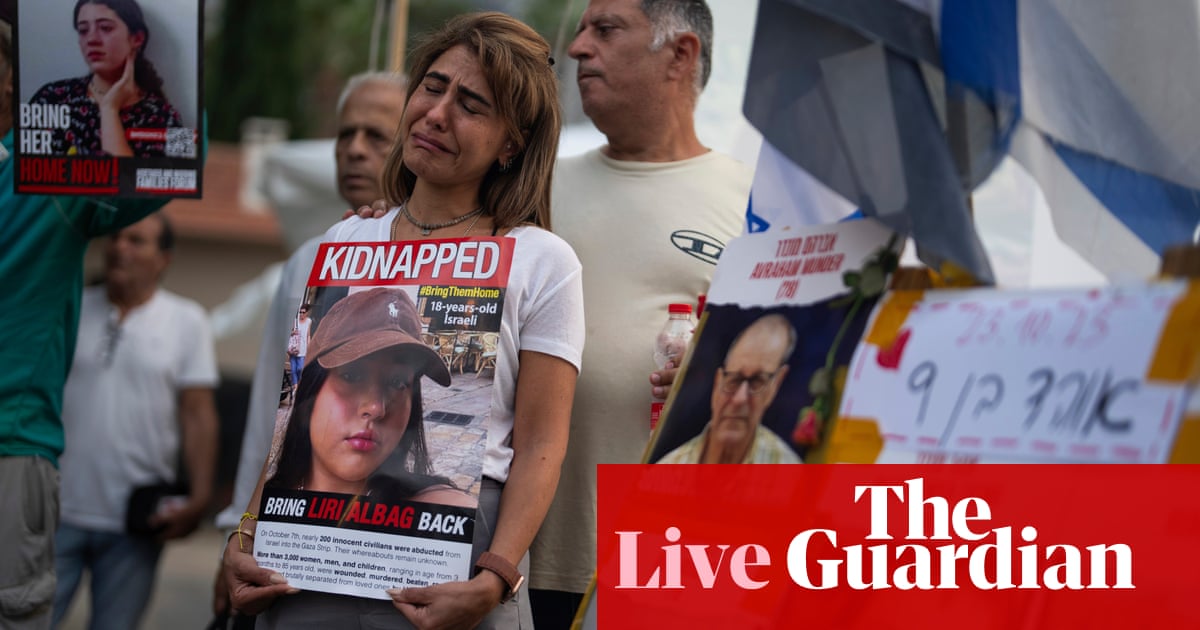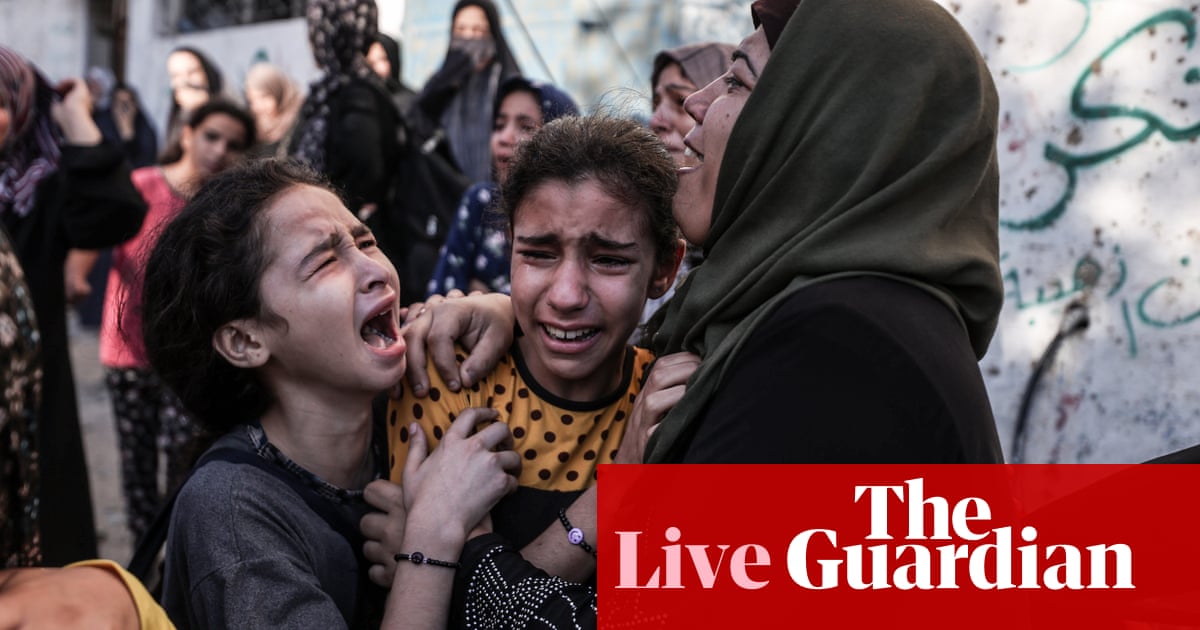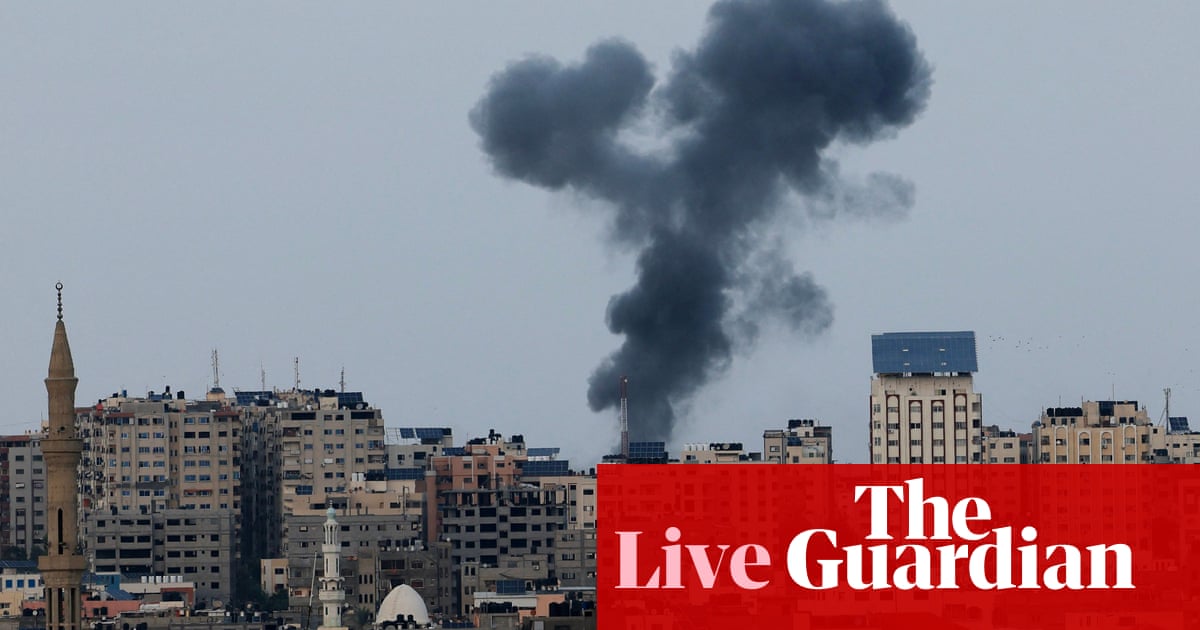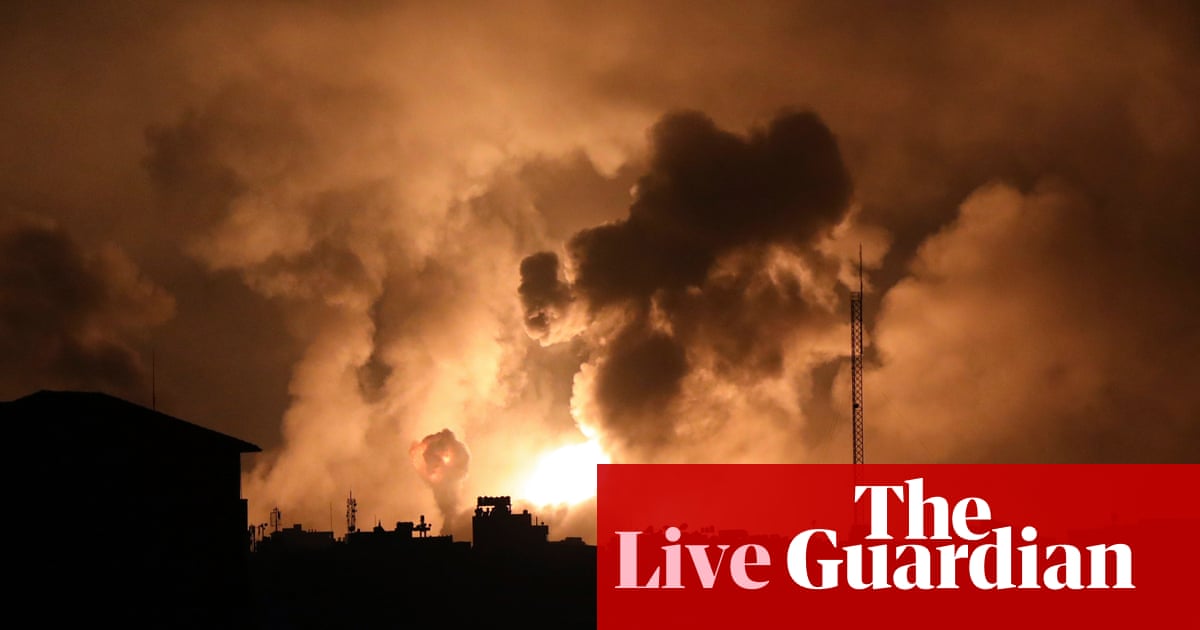
UN general assembly votes to call for immediate humanitarian truce in Gaza
The UN’s general assembly has overwhelmingly called for an immediate humanitarian truce in Gaza.
The resolution, drafted by Arab states, passed with 120 votes in favor, while 45 abstained and 14 – including Israel and the US – voted no.
An NBC News crew member in the Gaza Strip was able to message colleagues in London despite a communications blackout across the Palestinian territory.
“I’ve managed to get connectivity for a minute with a lot of difficulty and I wanted to let you know that all internet, electricity and everything has been cut off,” the news outlet reported him saying.
The situation we’re in is difficult, so difficult and very dangerous. We’re being extensively shelled by artillery and by air.
Amnesty International said it has lost contact with its team in Gaza and called on the Internet and telecommunications network to be restored “as a matter of urgency”.
Palestinian civilians are already besieged in the Gaza Strip and are now also trapped in a complete communications blackout, the human rights orgnisation said in a statement.
Rights groups have also found it increasingly difficult to document violations due to Israeli airstrikes and communications restrictions, it said. Amnesty added:
This communications blackout means that it will be even more difficult to obtain critical information and evidence about human rights violations and war crimes being committed against Palestinian civilians in Gaza, and to hear directly from those experiencing the violations.
"Hamas will feel our wrath tonight", says Israeli PM adviser
Israel is “beefing up the pressure” on Hamas and that pressure will continue to increase until it has achieved its goal, a senior adviser to Israeli prime minister Benjamin Netanyahu said.
Mark Regev, in an interview with MSNBC, said he would not go into ongoing military operations but that Israel will be hitting Hamas hard with the goal of “destroying their military machine and to dismantle its control of Gaza”.
We’re beefing up the pressure and they’ll be feeling it more and more.
Asked about reports of a communications blackout across the Gaza Strip, Regev said the idea of blocking communications is “standard operational procedure” when other countries have been involved in military operations.
If we want to hit targets in Gaza. we want to see that their command and control is disrupted, I think that’s good military logic.
In a worrying sign of the conflict’s potential to spread, the Egyptian military reported on Friday that two drones fired from the southern Red Sea had landed in two resorts on the Sinai peninsula, one of them falling on Taba, which sits on the border with Israel. Six people were reported hurt.
Hizan al-Assad, a member of the Iran-backed Houthi rebel forces in Yemen, posted a one-word message on social media reading “Eilat” in an apparently threatening reference to the nearby Israeli resort city a few miles away on the other side of the frontier.
Last week, US forces shot down three drones launched by the Houthi rebels that had been fired in the direction of Israel.
Here are some of the latest images we have received over the newswires from Gaza.
Médecins Sans Frontières (MSF) said it has also lost contact with some of their Palestinian staff on the ground in Gaza.
The international organisation said it is “deeply concerned” about the situation in the Palestinian territory.
In a statement posted to social media, it said it was particularly worried about the patients, medical staff and thousands of families taking shelter at Dar al-Shifa hospital and other health facilities.
It comes after Israel Defense Forces accused Hamas of using Dar al-Shifa hospital, the largest in the Gaza Strip, as a shield for its tunnels and operational centres.
It added:
We call for the unequivocal protection of all medical facilities, staff and civilians across the Gaza Strip.
Press freedom group "highly alarmed" by communications blackout in Gaza
The Committee to Protect Journalists (CPJ) said it is “highly alarmed” by reports of a communications blackout in Gaza.
The world is “losing a window into the reality” of what is happening in Gaza, as news organisations lose contact with their correspondents on the ground, the CPJ said in a statement.
A communications blackout is a news blackout that can lead to “serious consequences” with an information vaccum that can be filled with “deadly propaganda, dis- and misinformation,” it warned.
At this dark hour, we stand with journalists, with those truth seekers whose daily work keeps us informed with facts that shed light on the human condition and help to hold power to account.
In Gaza, the ever present fear of sudden death has prompted mothers to write their children’s names on their legs and hips, to help with identification if they are killed in an airstrike.
They have no control over the Israeli war waged against them, which is very much out of the 21st century – fought from the cockpits of jets and the control rooms of hi-tech naval ships. Yet, on the streets of southern Gaza, people’s lives have been bombed back decades.
On Friday night, that bombing intensified in the heaviest strikes of the war, turning the sky orange, as mobile phone networks, internet and even satellite phones stopped working, leaving Gaza almost entirely cut off from the world.
Even before then, families displaced from Gaza City and the cities further north, which have borne the worst of the Israeli strikes, numbering several hundred a day, were surviving by collecting broken furniture and scrap wood in the streets to use as fuel for cooking. There is very little cooking gas. And without power or internet, many had already abandoned phones and televisions, underlining an atmosphere of often brutal isolation. For those who have them, radios have become the sole link to the outside world.
Fridges do not work, and food- and water-borne disease is a daily anxiety. Those who can find accommodation with friends and family crowd into their homes. Others have overwhelmed the UN-run schools used as shelters in times of war in Gaza; more than 600,000 people have converged on 150 schools.
Yet more internally displaced people have converged on open areas around hospitals, believing them to be safer, and some families have taken to sleeping in their cars.
All the time, the Israeli strikes continue, scores each hour, a bombardment that has been relentless since the militant Islamist group Hamas massacred 1,400 Israelis, most of them civilians, in a surprise attack earlier this month through the Gaza border fence.
Read the full report by Hazem Balousha in Nuseirat and Peter Beaumont in Jerusalem.
The military wing of Hamas, the Al Qassam Brigades, said it is confronting an Israeli military ground incursion in the Gaza Strip.
“Violent engagements” are taking place on the ground near Beit Hanoun in northern Gaza and Bureij in the centre, it said in a statement.
In a separate statement, it said it had launched rockets towards Tel Aviv “in response to Zionist massacres committed against civilians”.
The UN general assembly has overwhelmingly called for an “immediate, durable and sustainable humanitarian truce” between Israel and Hamas and demanded unhindered aid access to the besieged Gaza Strip.
The motion drafted by Jordan is not binding, but carries political weight, reflecting the degree to which the US and Israel are isolated internationally as Israel steps up its ground operations.
The resolution does not name Hamas, which is holding around 220 civilian hostages who were seized during the devastating 7 October attacks. But it calls for the “immediate and unconditional release” of all civilians illegally held captive and demands their safety and humane treatment, and condemns attacks on both Palestinian and Israeli civilians.
It passed with 120 votes in favour, while 45 abstained, and 14, including Israel and the United States, voted against.
Following pressure from the US and Canada, an attempt to condemn Hamas by name, and demand an immediate release of hostages was passed by 88 to 55, but failed to win the required two-thirds majority.
Jordan had originally demanded an immediate ceasefire, but in a bid to maximise support, amended the draft by calling for an immediate durable and sustainable humanitarian truce leading to a cessation of hostilities.
It is the first time the UN has come to a collective view on the Middle East crisis, after four attempts to reach a common position on the smaller 15-strong UN Security Council failed due to vetoes being wielded either by Russia or the US.
The head of the UN’s children’s agency said it has lost touch with its Gaza staff.
Catherine Russell, the executive director of Unicef, said she was “extremely concerned” about the safety of her Gaza colleagues and about “another night of unspeakable horror” for the one million children in the Palestinian territory.
Posting to social media, she wrote:
All humanitarians and the children and families they serve MUST be protected.
Here are some of the latest images we have received over the newswires showing explosions in Gaza.
The UN has said it is concerned that war crimes were being committed on both sides of the conflict between Israel and Hamas.
A spokesperson for the UN human rights office Ravina Shamdasani, at a press conference in Geneva on Friday, said:
We are concerned that war crimes are being committed. We are concerned about the collective punishment of Gazans in response to the atrocious attacks by Hamas, which also amounted to war crimes.
“Nowhere is safe in Gaza,” she added, citing forcible transfer, collective punishment and the taking of hostages.
Israel’s use of explosive weapons with wide-area effects in densely populated areas has caused extensive damage to civilian infrastructure and loss of civilian lives that, by all appearances, is difficult to reconcile with international humanitarian law.
A humanitarian catastrophe was unfolding for the people inside Gaza who are “being collectively punished”. “Collective punishment is a war crime,” she said.
She said indiscriminate attacks by Palestinian armed groups had to stop, and that all civilian hostages held in Gaza must be “immediately and unconditionally” released. “The taking of hostages is also a war crime,” she said.
Scotland’s first minister, Humza Yousaf, said he cannot reach his family who have been trapped in Gaza since the beginning of hostilities, amid reports that Internet and mobile phone services have been cut off in the Palestinian territory.
Israeli military "cannot guarantee safety of journalists in Gaza"
Israel’s military has told international news organisations Reuters and Agence France Presse that it cannot guarantee the safety of their journalists operating in the Gaza Strip.
In a letter to the two news agencies, the Israel Defense Forces (IDF) said it was “targeting all Hamas military activity throughout Gaza”, adding that Hamas deliberately put military operations “in the vicinity of journalists and civilians”.
It noted that its high-intensity strikes on Hamas targets could cause damage to surrounding buildings and that Hamas rockets could also misfire and kill people inside Gaza. The letter concluded:
Under these circumstances, we cannot guarantee your employees’ safety, and strongly urge you to take all necessary measures for their safety.
The IDF’s letter came after the news agencies had sought assurances that their journalists in Gaza would not be targeted by Israeli strikes.
In response, Reuters said:
The situation on the ground is dire, and the IDF’s unwillingness to give assurances about the safety of our staff threatens their ability to deliver the news about this conflict without fear of being injured or killed.
AFP’s global news director Phil Chetwynd said:
We are in an incredibly precarious position and it’s important that the world understands that there is a large team of journalists working in extremely dangerous conditions.
At least 27 journalists have been killed since the outbreak of the Hamas-Israel war, the majority in Israel’s attacks on Gaza, according to the Committee to Protect Journalists.
Here’s a clip from Israeli army spokesperson Rear Adm Daniel Hagari’s earlier statement where he announced that the Israel Defense Forces (IDF) would be expanding its military operations in Gaza.
Addressing reporters at a press conference, he said the air force was conducting “extensive” strikes on tunnels and other infrastructure. He added:
In addition to the attacks carried out in the last few days, ground forces are expanding their operations tonight. The military is operating powerfully on all dimensions in order achieve the goals of the war.
PBS correspondent Leila Molana-Allen has shared a clip of convoys of Israeli soldiers and artillery coming into the northeastern corner of Israel’s border with Gaza.
Hamas says it is "ready" for Israeli ground invasion of Gaza
A top Hamas official said it was “ready” for an Israeli ground invasion of Gaza, after the IDF announced it would step up its ground operations in the Palestinian territory on Friday night.
AFP reported that Ezzat al-Rishaq, a senior member of the Hamas political bureau, posted on Telegram:
If Netanyahu decides to enter Gaza tonight, the resistance is ready.
In a separate statement, Hamas said the cutting off of Gaza’s Internet and mobile network signalled Israel’s “intention to commit more massacres and genocides away from the eyes of the press and the world”, NBC reported.
Israel’s military said it had increased its strikes “in a very significant way”, and AFP captured intense bombardment of northern Gaza.
UN general assembly votes to call for immediate humanitarian truce in Gaza
The UN’s general assembly has overwhelmingly called for an immediate humanitarian truce in Gaza.
The resolution, drafted by Arab states, passed with 120 votes in favor, while 45 abstained and 14 – including Israel and the US – voted no.




